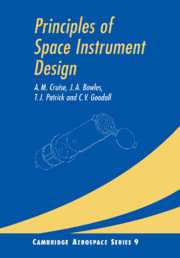Book contents
7 - Project management and control
Published online by Cambridge University Press: 12 November 2009
Summary
Preamble
The selection and operation of an appropriate and efficient project management scheme is as necessary to the success of a space project as the selection of the correct electronic components or the execution of a competent thermal design. Unlike pure engineering tasks, project management concerns the engineering of complex systems, the components of which are individual human beings. These sometimes exceed their specifications and sometimes fail to meet them, but they are always different. The presentation here of a structured approach to the creation of a project management scheme does not imply that one structure will suit all projects or all individuals. Considerable effort and care is needed to ensure that the management plan is efficient, appropriate and agreeable to all parties. The task of designing a project management plan can be seen as a method of ensuring that the project meets its time and cost budgets, in the same way as the electronic and mechanical engineering described previously in the book seek to meet power and mass budgets.
Introduction
Management is a very common word in everyday life but an accurate definition of it is difficult to get agreement on amongst practitioners. One definition that can be considered is:
‘Management is the task of deciding what should be done and then getting other people to do it’
Although there are some unfortunate overtones in the last part of the definition, this description is a good one for endeavors like space projects which require a team of people with a mix of skills.
- Type
- Chapter
- Information
- Principles of Space Instrument Design , pp. 327 - 356Publisher: Cambridge University PressPrint publication year: 1998



